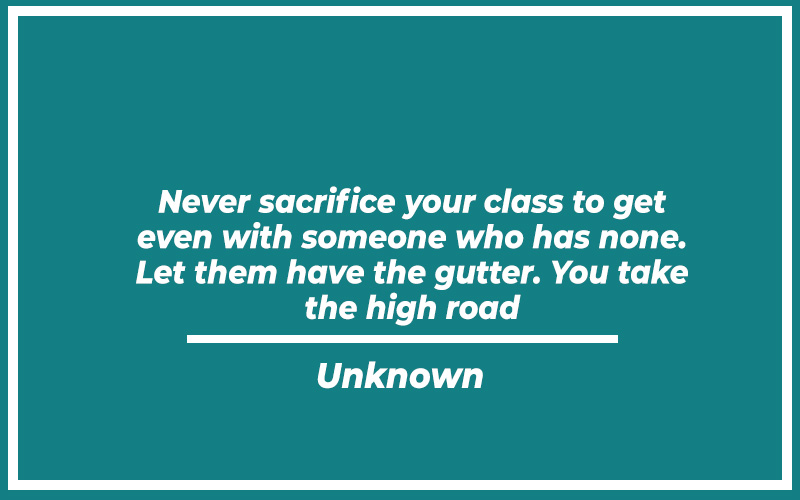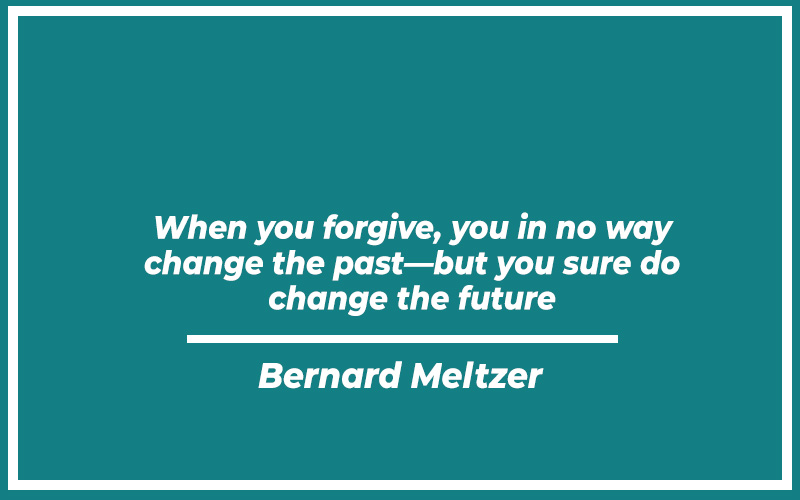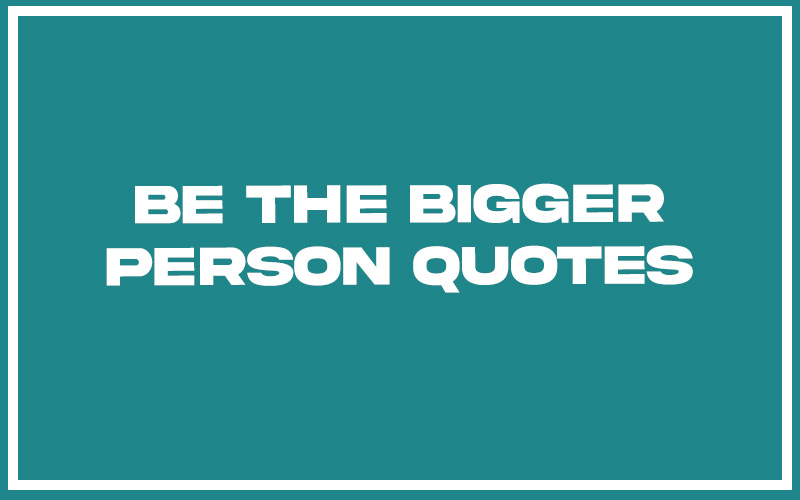When you encounter “be the bigger person” quotes, they’re guiding you toward grace and maturity in difficult situations.
These quotes encourage you to take the high road, offering wisdom on the power of patience, understanding, and kindness, even when it’s tough.
You might find these words motivating when you’re faced with conflict or negativity, pushing you to act with integrity instead of reacting impulsively.
Best Be The Bigger Person Quotes

“Never sacrifice your class to get even with someone who has none. Let them have the gutter. You take the high road.” – Unknown
This quote serves as a reminder that integrity and poise should never be compromised, even in the face of unprincipled behavior from others. By choosing to ‘take the high road,’ one maintains personal dignity and sets a standard of conduct that rises above petty disputes or vindictiveness.
This approach not only preserves one’s self-respect but also often disarms those who might thrive on conflict, showcasing a strength that transcends immediate gratification in favor of long-term esteem and personal honor.
Also Read: Evangelion Quotes (with Explanation)
“The best revenge is to be unlike him who performed the injury.” – Marcus Aurelius
Marcus Aurelius advocates for a form of moral victory that involves rising above the impulses of retaliation. This quote suggests that the truest form of revenge is not to mimic the wrongdoer but to retain one’s ethical standards, thereby distancing oneself from the negative actions of others.
Such a stance not only promotes personal peace but also acts as a rebuke to the injurer, highlighting a stark contrast in character and integrity. This approach aligns with Stoic principles of focusing on one’s own actions and responses as the locus of moral worth.
“How beautiful it is to stay silent when someone expects you to be enraged!” – Rachel Wolchin
Choosing silence over anger can be a powerful response, particularly when others anticipate a heated reaction. This quote by Rachel Wolchin praises the elegance and strength of maintaining composure under provocation.
Staying calm and collected often defuses tense situations and demonstrates a command over one’s emotions that can shift dynamics and influence perceptions. It’s a strategic and dignified response that converts a potential conflict into a moment of personal triumph.
“Your beliefs don’t make you a better person; your behavior does.” – Sukhraj S. Dhillon
Sukhraj S. Dhillon underscores the importance of actions over intentions. It’s not enough to hold noble beliefs if they don’t translate into tangible, positive behavior towards others.
This quote challenges individuals to reflect on the consistency between their ideals and their actions. True character is demonstrated in daily interactions and decisions, reminding us that the essence of morality lies in our conduct, not just in our thoughts or words.
“Be the one who nurtures and builds. Be the one who has an understanding and a forgiving heart, one who looks for the best in people. Leave people better than you found them.” – Mandy Hale
Mandy Hale encourages us to be proactive in our kindness and constructive in our interactions. This quote invites us to foster growth and positivity in others, approaching relationships with empathy and a nurturing spirit.
By aiming to leave people better than we found them, we contribute to a cycle of improvement and positivity that enhances both individual lives and broader communities. This approach embodies the essence of being the bigger person: transforming every encounter into an opportunity for mutual uplift.
“Grudges are for those who insist that they are owed something; forgiveness, however, is for those who are substantial enough to move on.” – Criss Jami
Criss Jami differentiates between holding grudges and choosing forgiveness. Holding onto past grievances often stems from a sense of entitlement to retribution or apology, whereas forgiveness is characterized by the strength to overcome bitterness and continue forward.
This quote extols the virtues of letting go as a means of personal liberation and maturity, suggesting that true inner peace requires the magnanimity to forgive and detach from past hurts.
“When you have a bad day, a really bad day, try and treat the world better than it treated you.” – Patrick Stump
Patrick Stump’s quote is an appeal for benevolence, even in the face of adversity. It promotes the idea that our reactions should not be contingent on how we are treated but should stem from a steadfast commitment to positivity and kindness.
By choosing to treat the world better, regardless of our personal experiences, we not only improve our own mood and outlook but also potentially uplift others. This behavior can break cycles of negativity and set a powerful example for others to follow.
“Mastering others is strength. Mastering yourself is true power.” – Lao Tzu
Lao Tzu’s wisdom emphasizes the superiority of self-control over the ability to dominate others. This quote reflects the profound strength found in self-mastery, which is essential for being the bigger person in challenging situations. True power, according to this philosophy, comes not from exerting influence over others but from governing one’s own actions and reactions.
This internal mastery can lead to peace and stability in one’s life, underscoring the importance of personal discipline and emotional intelligence in handling interpersonal conflicts.
“Peace is not absence of conflict, it is the ability to handle conflict by peaceful means.” – Ronald Reagan
Ronald Reagan’s definition of peace challenges us to reconsider our approach to conflict. Being the bigger person isn’t about avoiding disagreements but rather managing them with grace and composure.
This quote encourages us to develop and utilize conflict resolution skills that maintain harmony without sacrificing our principles. It advocates for a maturity that seeks resolution through dialogue and understanding, rather than force or avoidance, portraying peace as an active, dynamic process.
“Control your destiny or somebody else will.” – Jack Welch
Jack Welch’s admonition is a powerful call to take proactive control of one’s life and decisions. It suggests that without assertive action, others may impose their will, influencing one’s life path.
This quote underlines the importance of personal agency in being the bigger person, particularly in how we respond to adversity. By controlling our reactions and decisions, we assert our dignity and steer our lives in alignment with our values and goals.
“The first and best victory is to conquer self.” – Plato
Plato’s insight into personal conquests highlights that the greatest battle one can win is against one’s own weaknesses and impulses. This philosophical viewpoint reinforces the concept of being the bigger person by mastering one’s inner conflicts before attempting to resolve external ones.
Such self-conquest not only leads to better personal outcomes but also improves interactions with others, as self-aware and controlled individuals are more likely to respond constructively to provocations.
“Be the person who breaks the cycle. If you were judged, choose understanding. If you were rejected, choose acceptance. If you were shamed, choose compassion.” – Anonymous
This quote inspires a transformative approach to personal interactions, advocating for a proactive stance in breaking negative cycles of behavior. By choosing understanding, acceptance, and compassion, we actively decide to be the bigger person, altering the course of potentially destructive interactions.
This choice not only diffuses conflict but also fosters an environment of healing and mutual respect, which can lead to more substantial and rewarding relationships.
“Forgiveness is not an emotion; it’s a decision.” – Anonymous
This perspective on forgiveness highlights it as a conscious choice rather than a spontaneous emotional response. Choosing to forgive, especially when feelings of hurt are fresh, exemplifies the essence of being the bigger person.
It requires a deliberate decision to overlook slights and grievances in favor of emotional freedom and peace. This quote calls for a maturity that prioritizes long-term harmony over short-term vindication.
“No act of kindness, no matter how small, is ever wasted.” – Aesop
Aesop’s timeless words remind us that kindness is a fundamental component of being the bigger person. This quote suggests that every act of kindness has value, regardless of its scale or the immediate recognition it receives.
By consistently choosing to act kindly, even in small ways, we contribute to a more compassionate world and often inspire others to act similarly. This ripple effect of kindness is powerful, transforming not just individual interactions but potentially entire communities.
“An eye for an eye will only make the whole world blind.” – Mahatma Gandhi
Mahatma Gandhi’s famous admonition against revenge highlights the destructive cycle that retaliation can perpetuate. By advocating for non-retaliation, Gandhi promotes the idea that being the bigger person involves breaking cycles of violence and conflict through forgiveness and understanding.
This approach not only preserves one’s integrity but also contributes to broader peace and reconciliation. Gandhi’s philosophy encourages us to consider the long-term consequences of our actions on our communities and ourselves, urging a path of compassion over confrontation.
“Treat people as if they were what they ought to be and you help them become what they are capable of being.” – Johann Wolfgang von Goethe
Goethe’s quote inspires us to see the best in others and treat them according to their potential, not necessarily their present actions. By doing so, we can elevate their behavior and encourage positive development.
This approach to human interaction is a profound form of respect and optimism, reinforcing the concept that being the bigger person involves nurturing growth in others as well as ourselves. It’s about leading by example and fostering an environment where positive change is possible.
“Forgiveness is taking the knife out of your own back and not using it to hurt anyone else no matter how they hurt you.” – Anonymous
This powerful metaphor for forgiveness highlights its dual benefit: healing oneself while refusing to propagate pain. Choosing to forgive, according to this quote, is essentially an act of self-healing that also upholds one’s moral standards by not inflicting harm in return.
Being the bigger person, therefore, means prioritizing personal and ethical peace over revenge, which can often perpetuate the cycle of hurt.
“The measure of your maturity is how spiritual you become during the midst of your frustrations.” – Samuel Ullman
Samuel Ullman suggests that true maturity is demonstrated by one’s ability to maintain composure and spiritual depth in frustrating situations. This quote emphasizes that being the bigger person is an inward journey that involves cultivating patience, wisdom, and a deep sense of calm in the face of provocation.
Maturity, in this sense, is measured by the ability to transcend immediate emotional reactions and respond with thoughtful consideration.
“Do not overrate what you have received, nor envy others. He who envies others does not obtain peace of mind.” – Buddha
Buddha’s teaching warns against the dangers of envy and discontent, which can lead to a troubled mind and an unhappy life. By advocating contentment and gratitude for what we have, Buddha teaches us to focus on our own journey rather than comparing it to others’.
Being the bigger person, in this context, means cultivating a sense of inner peace and satisfaction, which frees us from the unrest that comes from coveting what others possess.
“Whenever you’re in conflict with someone, there is one factor that can make the difference between damaging your relationship and deepening it. That factor is attitude.” – William James
William James points out that our attitude in conflicts can either harm or enhance our relationships. By choosing an attitude of openness and understanding, we can turn conflicts into opportunities for relationship growth and deeper understanding.
Being the bigger person involves approaching disputes with a constructive mindset that seeks resolution and mutual benefit, rather than conquest.
“Keep in mind that the true measure of an individual is how he or she treats a person who can do them absolutely no good.” – Ann Landers
Ann Landers’ quote underscores the importance of treating all individuals with kindness and respect, regardless of what they can offer in return. This principle reflects the essence of being the bigger person by advocating for a universal respect that transcends personal gain.
It speaks to the integrity and moral character of individuals who choose to act with decency toward everyone, which is a true test of their values and humanity.
Life becomes easier when you learn to accept an apology you never got.” – Robert Brault
Robert Brault’s quote emphasizes the liberating power of letting go of grudges, even in the absence of an apology. Holding onto resentment can weigh heavily on one’s emotional well-being. By choosing to forgive and move forward without waiting for an apology, individuals reclaim their peace and autonomy.
This proactive approach fosters inner tranquility and prevents others’ actions from dictating one’s happiness. Ultimately, it underscores that personal growth and contentment often stem from within, independent of external validations or reconciliations.
“Anger makes you smaller, while forgiveness forces you to grow beyond what you were.” – Cherie Carter-Scott
Cherie Carter-Scott highlights the contrasting effects of anger and forgiveness on personal development. Harboring anger can constrict one’s perspective and hinder growth, keeping individuals trapped in negative emotions. In contrast, embracing forgiveness challenges one to rise above past hurts, fostering emotional expansion and maturity.
This process not only heals wounds but also cultivates resilience and empathy, enabling individuals to evolve beyond their previous limitations. The quote serves as a reminder that true strength lies in the capacity to forgive and transform adversity into personal growth.
“The less you respond to negative people, the more peaceful your life will become.” – Unknown
This adage underscores the importance of selective engagement in preserving one’s peace. Reacting to negativity often fuels further discord, disrupting personal harmony. By choosing not to engage with negative individuals or situations, one maintains control over their emotional state, fostering a tranquil and balanced life.
This approach reflects emotional intelligence and self-discipline, highlighting that sometimes, silence and non-engagement are powerful tools in safeguarding one’s well-being. It encourages prioritizing inner peace over the impulse to react, leading to a more serene existence.
“Holding onto anger is like drinking poison and expecting the other person to die.” – Buddha
Attributed to Buddha, this metaphor illustrates the self-destructive nature of holding onto anger. Nurturing resentment harms oneself more than the object of one’s anger, leading to emotional and possibly physical distress.
By releasing anger, individuals free themselves from its toxic grip, promoting healing and inner peace. The quote serves as a poignant reminder that forgiveness and letting go are acts of self-care, essential for one’s health and happiness. It advocates for personal liberation through the conscious release of negative emotions.
“Sometimes you have to be silent because no words can explain what is going on in your mind and heart.” – Unknown
This quote reflects the profound moments when silence becomes the most authentic response. In complex emotional situations, words may fail to capture the depth of one’s feelings or thoughts. Choosing silence allows for introspection and prevents misunderstandings that hastily spoken words might cause.
It honors the complexity of human emotions and acknowledges that some experiences are beyond verbal expression. This approach fosters self-awareness and can lead to more thoughtful and genuine communication when one is ready to articulate their feelings.
“The weak can never forgive. Forgiveness is the attribute of the strong.” – Mahatma Gandhi
Mahatma Gandhi emphasizes that forgiveness requires immense strength and courage. It is not a sign of weakness but a deliberate and powerful act of letting go of resentment. Forgiving those who have wronged us demands inner fortitude and a commitment to peace.
This perspective challenges the misconception that holding onto grudges signifies strength, instead portraying forgiveness as a testament to one’s resilience and moral integrity. It encourages individuals to embrace forgiveness as a path to personal empowerment and societal harmony.

“When you forgive, you in no way change the past—but you sure do change the future.” – Bernard Meltzer
Bernard Meltzer highlights the transformative power of forgiveness on one’s future. While past events remain unaltered, choosing to forgive reshapes one’s emotional trajectory, opening doors to healing and new possibilities.
This act liberates individuals from the chains of past grievances, allowing them to move forward unburdened. It underscores the proactive role one can play in shaping their destiny, emphasizing that while we cannot control past actions, we hold the key to our future happiness through forgiveness.
Also Read: DND Quotes (with Explanation)
Final Thoughts
“Be the bigger person” quotes serve as gentle reminders that true strength is shown through compassion and forgiveness.
When you choose to rise above petty conflicts and show empathy, you’re not just resolving a situation more peacefully; you’re also setting a powerful example for others.
Next time you read these quotes, let them inspire you to act with generosity and poise, no matter the challenge at hand.

